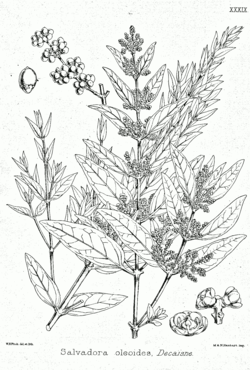This article needs additional citations for verification .(November 2019) |
| Salvadora oleoides | |
|---|---|
 | |
| Scientific classification | |
| Kingdom: | Plantae |
| Clade: | Tracheophytes |
| Clade: | Angiosperms |
| Clade: | Eudicots |
| Clade: | Rosids |
| Order: | Brassicales |
| Family: | Salvadoraceae |
| Genus: | Salvadora |
| Species: | S. oleoides |
| Binomial name | |
| Salvadora oleoides | |
| Synonyms [3] | |
Salvadora stocksiiWight | |
Salvadora oleoides is a small bushy evergreen tree found in India and Pakistan and southern Iran. Its common name is Vann or (Large) Toothbrush Tree.
Contents
The root and stem possess various antimicrobial agents and is traditionally used as toothbrush in Pakistan and India.

